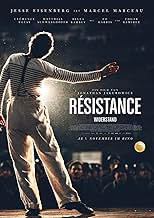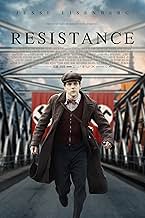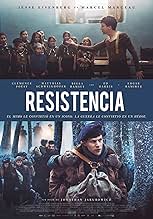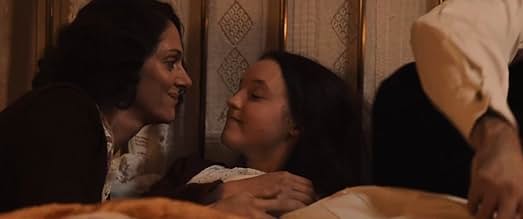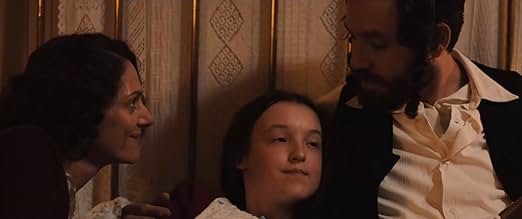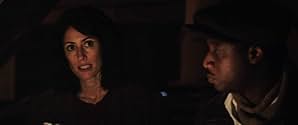La storia di un gruppo di boy scout ebrei che hanno lavorato con la resistenza francese per salvare la vita di diecimila orfani durante la seconda guerra mondiale.La storia di un gruppo di boy scout ebrei che hanno lavorato con la resistenza francese per salvare la vita di diecimila orfani durante la seconda guerra mondiale.La storia di un gruppo di boy scout ebrei che hanno lavorato con la resistenza francese per salvare la vita di diecimila orfani durante la seconda guerra mondiale.
- Regia
- Sceneggiatura
- Star
- Premi
- 2 candidature totali
- Georges
- (as Géza Rohrig)
Recensioni in evidenza
That being said, give it a few days when I'll have forgotten most of the specifics of this film, and I will probably once again have no idea who Eisenberg is. It's not an OSCAR-worthy performance, but it's acceptable.
The story itself I found engaging, all the better for being based on true events, and I have no regrets at having made the time to watch it. I probably won't watch it a second time in a few years, once it's a distant memory, but that's more to do with having lots that I do want to rewatch, and (probably) not enough time left to fit them all in.
Can I, though, take a moment to give 10/10 to the reviewer who commented "So Marcel Marceau was a Resistance fighter, huh? He kept that quiet." :-) Best one-liner I've read in ages!
Jesse Eisenberg (and an iffy French accent) plays Marcel, the son of a multi-generational Jewish butcher in Strasbourg France. Out of familial duty, Marcel works at the butcher shop with his father, but his passion is in performing arts. One evening his dad (Karl Markovics) 'catches' him performing a silent Charlie Chaplin act on stage at a local cabaret. A parental lecture follows. Marcel's penchant for entertaining does come in handy when he helps his brother Alain (Felix Moati) and cousin Georges (Geza Rohrig, SON OF SAUL) rescue 123 orphans.
The opening sequence in the film finds young Elsbeth (Bella Ramsey, Lorna Luft in JUDY) witnessing her Jewish parents being murdered in the street outside their Munich home by Nazis in 1938. We next see her in the group of 123 orphans noted above. As a kind of framing device, we flash forward to 1945 in Nuremberg, as General George S Patton (Ed Harris) is addressing the troops and telling the story of a remarkable man. That man is Marcel, and the film then takes us through his journey and we "see" the story that General Patton is "telling."
When Marcel and his brother agree to join the French Jewish Resistance (also known as Organization Juive de Combat, OJC), they face more danger, and maintain their focus on rescuing orphans. Helping in the cause is Emma (Clemence Poesy, IN BRUGES), and a mutual respect and attraction forms between she and Marcel. The brutality of the war is shown through the actions of Klaus Barbie (Matthias Schweighofer). As the head of the Gestapo in France (and known as The Butcher of Lyon), Barbie works out of the Hotel Terminus, and his sadistic tendencies find their way into the Resistance.
Once the war escalates to a certain point, the Resistance must decide whether it's best to continue hiding the kids, or risk the perilous journey across the Alps in hopes of freedom. In reality, it's not much of a decision, as staying put likely means torture, if not death. There are some touching moments between Marcel and the kids, and some acts of pure bravery from all involved.
At times, the film teeters into LIFE IS BEAUTIFUL territory, but never for long. The moments of pure terror are well presented, yet never overly graphic. We feel the stress of the Resistance as they struggle to get the kids to safety, and feel their pain in tragic losses. As the film ends, General Patton finishes his story by introducing his story's Marcel. The spotlight then lands on Marcel Marceau in full make-up and costume. Marceau, of course, went on to become famous and beloved around the world as the most famous mime. Filmmaker Jakubowicz has delivered yet another fascinating story of heroism and courage ... another story that deserves to be remembered.
Jesse Eisenberg delivers a decent performance if you can look past the shoddy French accent, but Clémence Poésy and Matthias Schweighöfer are the true stars here, with the nazi brutality of the latter made all the more shocking when contrasted with the concern he shows towards his own child.
A few reviews comment on the 'formulaic' nature of this film - whilst from an entertainment perspective this might be a valid critique, I personally believe it is vital that these stories are told and retold, and highlighting the bravery of an individual is a valuable way to do so.
Lo sapevi?
- QuizThe real life Klaus Barbie was recruited by the US after the war and lived as a free man for more than 30 years. He lived in Bolivia until 1983, then he was extradited to France and died in prison.
- BlooperWhen the camera pans Patton's troops, there is an intermingling of black and white faces. But the Army was strictly segregated in 1945.
- Citazioni
Georges: I'm not going to bring them more instability just because you suddenly feel it may get dangerous.
Georges: You are a mile away from nazi Germany where an extremely popular leader is preparing the most powerful army in the history of Europe to conquering a neighboring country while he blames all possible evil on the Jews.
- Curiosità sui creditiEpilogue: "For his contribution to the French resistance, Marcel Marceau made 'Grand Officier de la Légion d'Honneur' and was awarded the National Order of Merit in France. He is recognized as the most important Mime of all time. Marcelle's father, Charles Mangel, was deported to the Auschwitz Concentration Camp, where he was killed in 1945. After the war, Nazi hunters Beate and Serge Klarsfeld found Klaus Barbie hiding in Bolivia. He was extradited to France, where he was convicted of crimes against humanity. He died in prison in 1991. The Jewish Resistance groups of France saved ten thousand children during World War II. The Nazis advocated killing children of 'dangerous groups' as part of their plan to 'purify the Aryan race.' They killed 1.5 million children, including tens of thousands of Romani children, children with physical and mental disabilities...and over a million Jewish children. This film is dedicated to them. We will never forget."
- ConnessioniReferences Suss l'ebreo (1940)
I più visti
- How long is Resistance?Powered by Alexa
Dettagli
- Data di uscita
- Paesi di origine
- Siti ufficiali
- Lingue
- Celebre anche come
- Resistance
- Luoghi delle riprese
- Aziende produttrici
- Vedi altri crediti dell’azienda su IMDbPro
Botteghino
- Lordo Stati Uniti e Canada
- 7464 USD
- Lordo in tutto il mondo
- 449.753 USD
- Tempo di esecuzione2 ore
- Colore
- Proporzioni
- 2.35 : 1
Contribuisci a questa pagina






